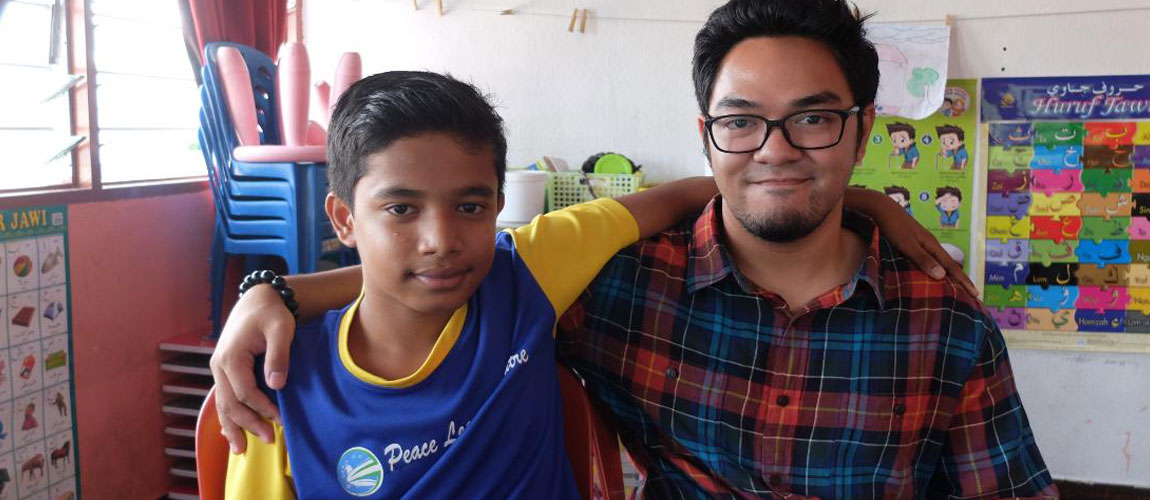The children are Rohingya refugees and the house is a private school where they learn Malay, English, math and science.
This life is light years away from the one the children left behind in Myanmar.
“People were getting hit and killed and the police were arresting people. My whole village was burned down,” 13-year-old Anwar Sadek Shah Ahmad says softly, cowering into his teacher’s shoulder.
Anwar and his family fled their fishing village in Myanmar’s Rakhine State in 2013 after violence broke out.
His grandmother, he said, only fled Myanmar last year and is now in a refugee camp in Bangladesh, where more than 680,000 Rohingya have fled to since August 2017.
There are thousands of children like Anwar in Malaysia — he’s among the Rohingya refugees who escaped from Rakhine State by boat largely before 2015, when Kuala Lumpur began turning back Rohingya arrivals.
Even though they consider themselves the lucky ones, those who made it to Malaysia still lead lives fraught with risk and hardship.
“They have no legal rights — no right to work, no opportunity for mainstream education, and are obliged to eke out a very difficult living in the grey market economy of the country,” said Richard Towle, the United Nations High Commissioner for Refugees (UNHCR) Representative for Malaysia.
This is the case for all refugees in Malaysia. Most of the 150,000 refugees there are from Myanmar, but there are also Pakistanis, Syrians, Yemenis and Palestinians.
 Anwar’s father has been working illegally in Penang since 2006 and paid smugglers to bring over his son, daughter and wife by boat. Anwar also has an infant brother who was born in Malaysia. The family are now registered with the UNHCR.
The UN body has registered 62,000 Rohingya refugees in Malaysia, but the organization estimates there could be another 30,000 to 40,000 who are there illegally and don’t have official refugee status — obtaining it is a lengthy process that can only happen in the Malaysian capital, Kuala Lumpur.
“UNHCR Malaysia prioritises refugees in immigration detention, vulnerable refugees who have come to UNHCR from referral partners including government agencies, and others who have been interviewed and found to need UNHCR’s protection and support,” said Towle.
It’s not clear whether Malaysia will accept any of those who have fled since August, an exodus that has lead to the world’s fastest growing refugee crisis in Bangladesh.
source: CNN
Anwar’s father has been working illegally in Penang since 2006 and paid smugglers to bring over his son, daughter and wife by boat. Anwar also has an infant brother who was born in Malaysia. The family are now registered with the UNHCR.
The UN body has registered 62,000 Rohingya refugees in Malaysia, but the organization estimates there could be another 30,000 to 40,000 who are there illegally and don’t have official refugee status — obtaining it is a lengthy process that can only happen in the Malaysian capital, Kuala Lumpur.
“UNHCR Malaysia prioritises refugees in immigration detention, vulnerable refugees who have come to UNHCR from referral partners including government agencies, and others who have been interviewed and found to need UNHCR’s protection and support,” said Towle.
It’s not clear whether Malaysia will accept any of those who have fled since August, an exodus that has lead to the world’s fastest growing refugee crisis in Bangladesh.
source: CNN
The children are Rohingya refugees and the house is a private school where they learn Malay, English, math and science.
Anwar and his family fled their fishing village in Myanmar’s Rakhine State in 2013 after violence broke out.
His grandmother, he said, only fled Myanmar last year and is now in a refugee camp in Bangladesh, where more than 680,000 Rohingya have fled to since August 2017.
There are thousands of children like Anwar in Malaysia — he’s among the Rohingya refugees who escaped from Rakhine State by boat largely before 2015, when Kuala Lumpur began turning back Rohingya arrivals.
Even though they consider themselves the lucky ones, those who made it to Malaysia still lead lives fraught with risk and hardship.
This is the case for all refugees in Malaysia. Most of the 150,000 refugees there are from Myanmar, but there are also Pakistanis, Syrians, Yemenis and Palestinians.

Anwar’s father has been working illegally in Penang since 2006 and paid smugglers to bring over his son, daughter and wife by boat. Anwar also has an infant brother who was born in Malaysia. The family are now registered with the UNHCR.
The UN body has registered 62,000 Rohingya refugees in Malaysia, but the organization estimates there could be another 30,000 to 40,000 who are there illegally and don’t have official refugee status — obtaining it is a lengthy process that can only happen in the Malaysian capital, Kuala Lumpur.
“UNHCR Malaysia prioritises refugees in immigration detention, vulnerable refugees who have come to UNHCR from referral partners including government agencies, and others who have been interviewed and found to need UNHCR’s protection and support,” said Towle.

